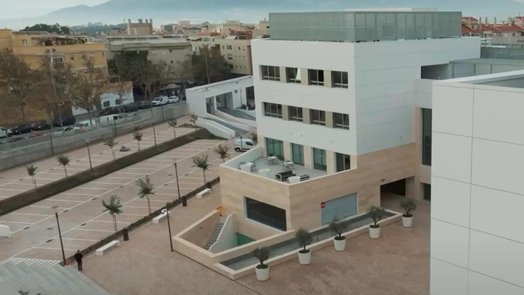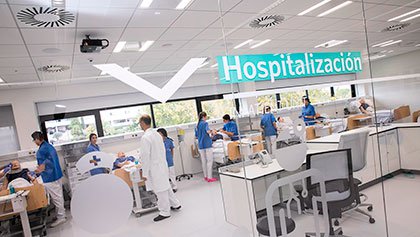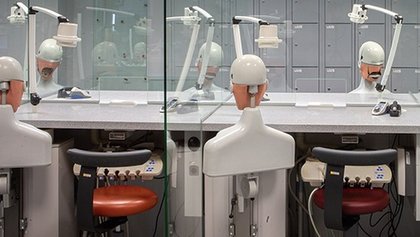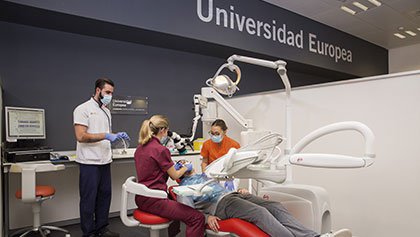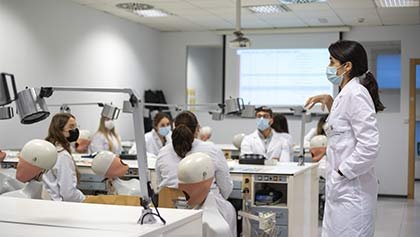Bachelor's degree in Dentistry & Dental Health in Málaga
The Bachelor's Degree in Dentistry will prepare you to be a professional who cares for and transforms people's dental health. From the first year, you'll learn about anatomy, physiology and advanced techniques in realistic clinical simulation environments, where you'll put everything you've learnt into practice.
With access to state-of-the-art labs, you'll specialise in dental diagnostics and treatment, addressing areas such as orthodontics, prosthetics, surgery and public health. You'll also benefit from the latest technology, such as artificial intelligence in dentistry, which will allow you to prepare for the challenges of the future. Throughout the degree, you'll develop skills in children's dental health, cosmetic treatments and community dentistry, preparing you for a field full of opportunities and high employability rates.
Official degree issued by Universidad Europea de Andalucía
| Campus-based | Málaga | 5 years, 300 ECTS | Start: 14 sep. 2026 | School of Biomedical Sciences and Sport |
An innovative university project has arrived in Málaga
Step into a transformative learning environment crafted to help you unlock your full potential and equip you with the tools you need to face the challenges of the future. Our innovative, hands-on approach to education immerses you in real-world learning, where you’ll collaborate with professionals from diverse fields. Here, you’ll gain not only expertise in your profession but also a holistic, future-ready perspective to make a lasting impact.
State-of-the-art facilities
*The images shown are for reference only and may vary from the final result.
A curriculum designed to train dentists to meet the challenges of today's oral health
This degree will give you a solid grounding in core areas such as anatomy and physiology, cell biology and microbiology, along with specific knowledge in public health and applied biostatistics, helping you to build skills in dentistry from the very first year.
During the early years, you'll gain a broad, detailed overview of dental science and technique, including ergonomics, biomaterials, and pharmacology. As you progress through the curriculum, with the support of specialist teachers, you’ll be able to delve deeper into specialist fields such as orthodontics, endodontics, oral surgery, and paediatric dentistry, developing practical skills in dental treatment, diagnostic imaging, and managing patients with special needs. In the final year, you'll carry out an intensive supervised placement in our dental clinic and you'll complete your Final Degree Project (TFG), thus acquiring a comprehensive applied perspective of professional practice.
This progressive approach ensures that you can combine theoretical knowledge with clinical practice from the outset, preparing you to practise confidently and professionally in modern dentistry.
Study plan structure
Plan de estudios ofertado en el curso actual
Programa de estudios
PRIMER CURSO
| Materia | ECTS | Tipo | Idioma de impartición |
|---|---|---|---|
| Anatomy and physiology of the human body I | 6 | BA | EN/ES |
| Cell biology and human genetics | 6 | BA | EN/ES |
| Epidemiology, public health and applied biostatistics | 6 | BA | EN/ES |
| Modern language: english | 6 | OB | EN/ES |
| Documentation | 3 | BA | EN/ES |
| Anthropology and history of dentistry | 3 | BA | EN/ES |
| Anatomy and physiology of the human body II | 6 | BA | EN/ES |
| Biochemistry in dentistry | 6 | BA | EN/ES |
| General microbiology and immunology | 6 | BA | EN/ES |
| Psychology and communication skills | 6 | BA | EN/ES |
| Introduction to clinical dentistry and ergonomics | 6 | BA | EN/ES |
Internships
The Degree in Dentistry at Universidad Europea de Andalucía offers a practical training of excellence, assigning 36 ECTS to supervised clinical practices, distributed in Initiation to Integrated Clinical Practice (12 ECTS) and Supervised Practices (24 ECTS), which are developed during the last four semesters of the program. These internships are key to the training of future dentists, providing the clinical experience necessary to meet the demanding objectives of the degree.
The internship takes place at the Polyclinic of Universidad Europea de Andalucía, in a real healthcare environment. Students will work in pairs, in a dental clinical rotation that allows them to evaluate and treat patients in a comprehensive manner, under the constant supervision of a team of professors with extensive professional experience.
During this internship, students not only develop clinical competencies, but also focus on communication skills, clinical management, critical thinking and professional judgment. This comprehensive assessment ensures that students acquire the skills and attitudes necessary for successful professional practice. Working with real patients of all ages and conditions provides a unique and valuable experience that completes their academic training, giving them the confidence and skills to perform in the field of dentistry upon graduation.
This intensely supervised, hands-on approach provides solid, real-world training, preparing future dentists for the challenges of the professional environment with a comprehensive experience that sets them apart in the job market.
Career opportunities
Healthcare
- Private practice, either as a self-employed professional with your own dental practice or working in third-party clinics and practices.
- Primary and hospital care, providing dental services in public and private health centres, hospitals, or health insurance companies.
- Joining the pharmaceutical industry and working in companies in the dental industry, collaborating in research, development and technical consultancy.
Education
- Taking part in oral health prevention campaigns in primary, secondary and university schools.
- Teaching in public and private institutions, universities and hospitals.
- Collaborating with NGOs focused on dental health.
Other areas
- Scientific research in the areas of advanced dentistry and oral health.
- Providing service in prisons and specialisation in legal and forensic dentistry.
Admissions
Start your future at Universidad Europea
You can become a student at Universidad Europea in three easy steps.
1
Admission exams
Start your admission process by calling +34 952006801 or request information and our advisors will contact you.
2
Place reservation
Once you have been admitted, secure your place by paying the reservation fee.
3
Enrollment
Submit the required documents to formalise your enrollment.
Scholarships and financial aid
We want to help you. If you want to study at Universidad Europea, you will have at your disposal a wide selection of own and official scholarships.
Credit recognition and transfers
You don’t have to stick with something you don’t like. That’s why we’ve designed specific plans for credit recognition and transfers.
Request your online credit recognition review, transfer your academic file and start studying at Universidad Europea.
Admission profile and entry requirements
The ideal profile for the Bachelor’s Degree in Dentistry includes people genuinely committed to improving the oral health and wellbeing of patients, as well as a deep interest in the anatomical and technical knowledge needed to accurately treat the stomatognathic system. These students stand out for their manual skills and attention to detail, which are essential qualities for performing high-precision procedures. They also show analytical and problem-solving skills, which are essential for dental diagnosis and treatment.
Faculty
The faculty of the Dentistry Degree at Universidad Europea de Andalucía consists of highly qualified professionals with extensive experience in both academia and clinical practice. The educators in this program combine a strong scientific background with outstanding professional careers, ensuring that students receive a comprehensive and up-to-date education rooted in the realities of the dental field.
The faculty includes experts in various dental specialities, from oral surgery and implantology to orthodontics, periodontics, and prosthodontics, providing students with a well-rounded and multidisciplinary perspective. Furthermore, many of the instructors have over 15 years of experience as practising dentists in private clinics, bringing a practical, case-based approach to the learning experience.
Frequently Asked Questions
How many years is a dentistry degree?
The dentistry degree at Universidad Europea is a five-year programme that will equip you with the knowledge and skills to enjoy a career in the field of oral health. The degree in dentistry has a total of 300 ECTS, with some subjects compulsory and other elective. Over the course of the degree, students will cover a range of topics, enabling them to choose which area of dentistry they would potentially like to specialise in once they complete their studies. Examples of subjects include:
- Anthropology and History of Dentistry
- General Microbiology and Immunology
- Diagnostics in Dentistry
- Orthodontics
- Pediatric Dentistry
What are the requirements to study dentistry?
There are a number of access routes to the degree in Dentistry. These include:
- Bachelor's degree.
- UNED credential. Certain foreign bachelor's degrees or European bachelor's degree.
- International bachelor's degree (IB).
- Access for over 25 years of age.
- Access for over 45 years old.
- Recognition of studies
Is dentistry a good career for the future?
Dentistry is a good career for the future for many reasons. Some of the main reasons why people choose to study a dentistry dentree are:
- It produces personal gratification
- It allows you to help patients recover their health
- It is well paid
- There is little unemployment
- It is a profession valued by society
- It allows you to undertake and develop your own business
Where can I study dentistry?
You can study your degree in dentistry at Universidad Europea in Madrid. We are one of the leading private universities in Spain, and have more than 25 years of experience in training young people to develop the skills and abilities necessary to become leaders in whatever sector they choose.
If you choose to study your bsc in dentistry at Universidead Europea, you will follow an academic model based on experiential learning. That means from day one you will be able to take part in real cases in clinical settings. Throughout your programme you will complete internships and work placements at dental pratices across Madrid. In addition, you will learn at our similulated hospital on campus, allowing to to further develop you dentistry skills.

